Blog Article

If you are a developer or work with one, you probably are aware of how time-consuming it is to write code functionality by functionality. Writing code for organizing your code as well as each little functionality. It’s a headache.
As humans we are prone to making errors, thus making it quite possible to get a bunch of bugs while coding. Development all in all is a very complex task as we all know it. Frameworks can help make the whole development process easier by saving you the hassle of writing code from scratch. This also helps in speedy design delivery and troubleshooting.
So, What is a Software Framework?
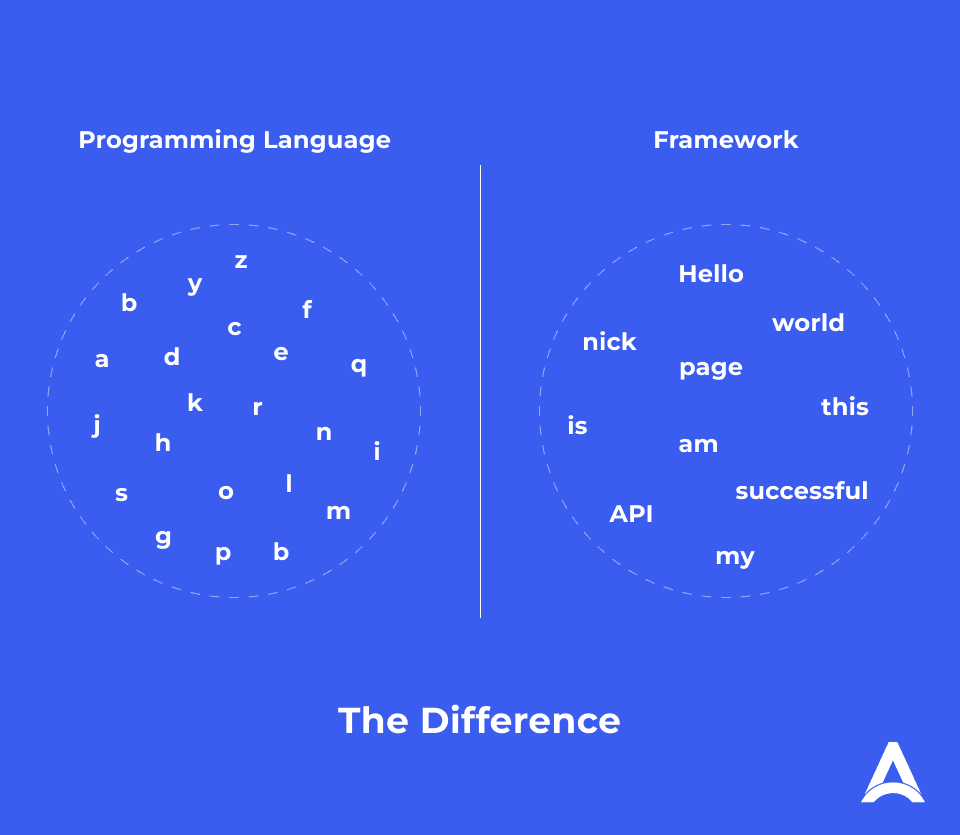
In Computer Programming, a software framework is an abstraction in which a software that offers general functionalities can be selectively changed by additional user-written codes.
A framework usually encapsulates images, libraries, and documents that can be personalized to each project enabling the developer to seamlessly add or replace features to offer added functionalities to the project.
Types of Software Frameworks
You can find almost every type of framework nowadays that intend to solve issues that come forth in the development process of a project. Naturally, with so many programming languages out there to choose from, there are many frameworks available. Depending on the kind of framework you need, you can choose from these available types of frameworks based on your purpose➖
1) Front-end frameworks
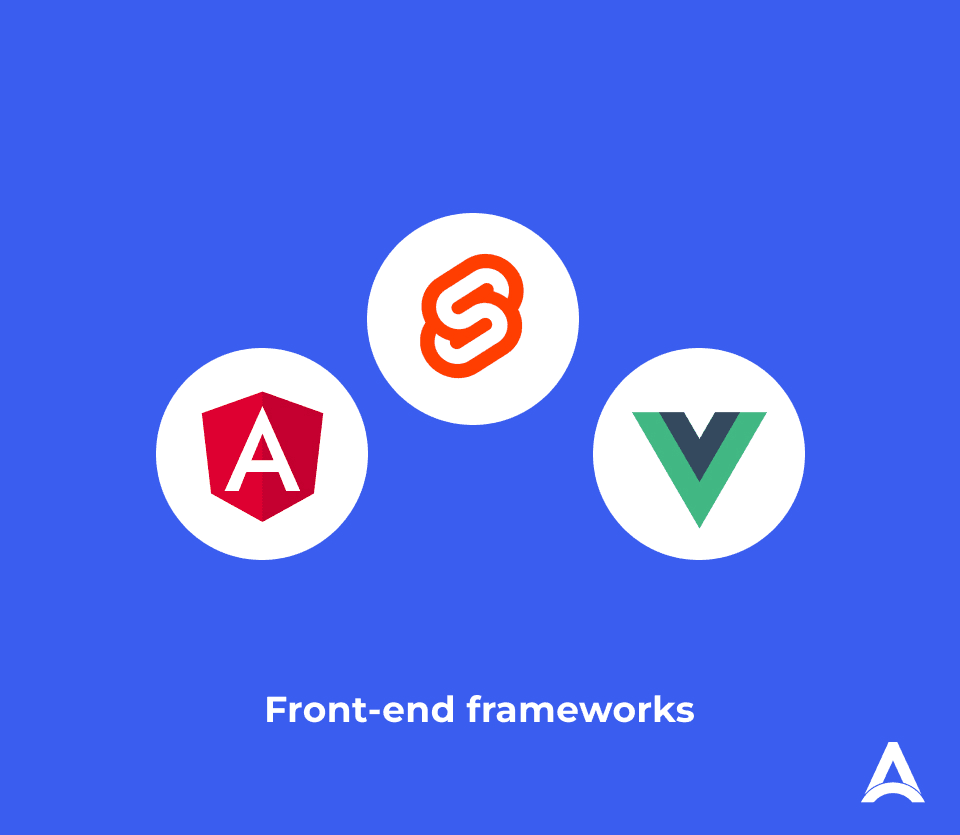
Front-end frameworks are used for development of the front-end of the web app. They are responsible for displaying responsive pages. By enabling that each structure is placed in a smooth and attractive layout, these frameworks ensure less development time and responsive interface design.
Angular , Vue.js, and Svelte are a few examples of front-end frameworks.
2) Back-end frameworks
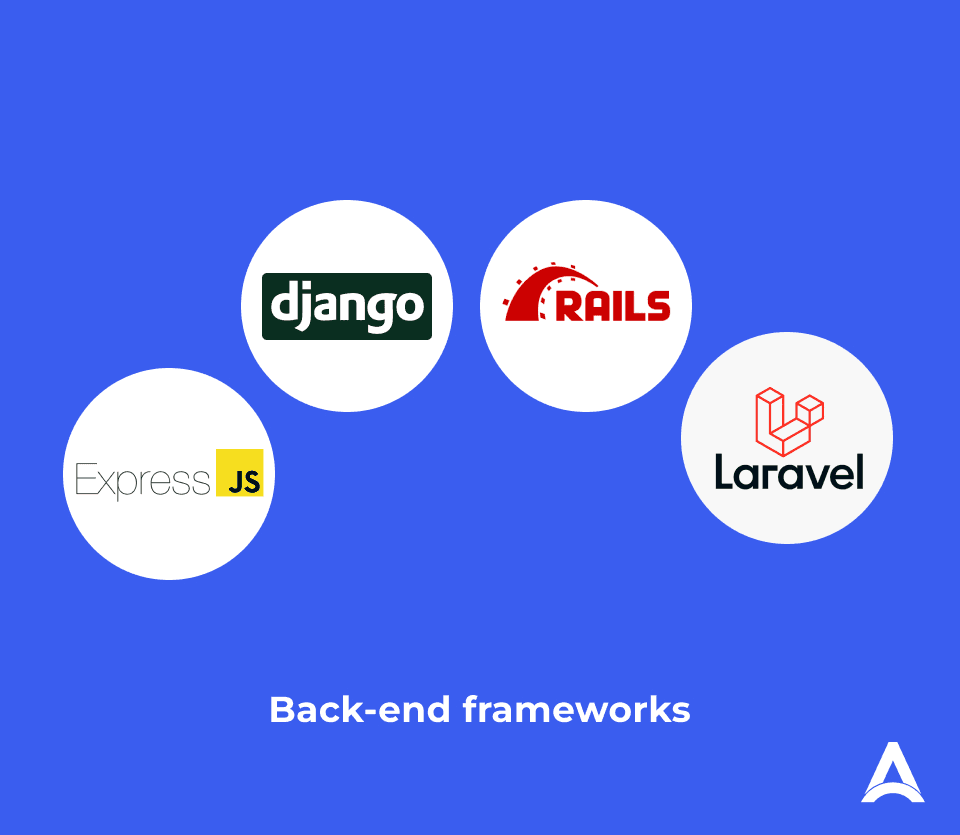
Back-end frameworks are used for the development of the back-end of the web app. These are the most commonly used frameworks in the development ecosystem. These frameworks assist in the server-side configurations of your application. These were conceived to provide components to manage functionalities that involve functionalities that depend on the backend. These frameworks facilitate database access, session management, etc.
Express, Ruby on Rails, Django, and Laravel are some of the most popular back-end frameworks.
3) Mobile development frameworks
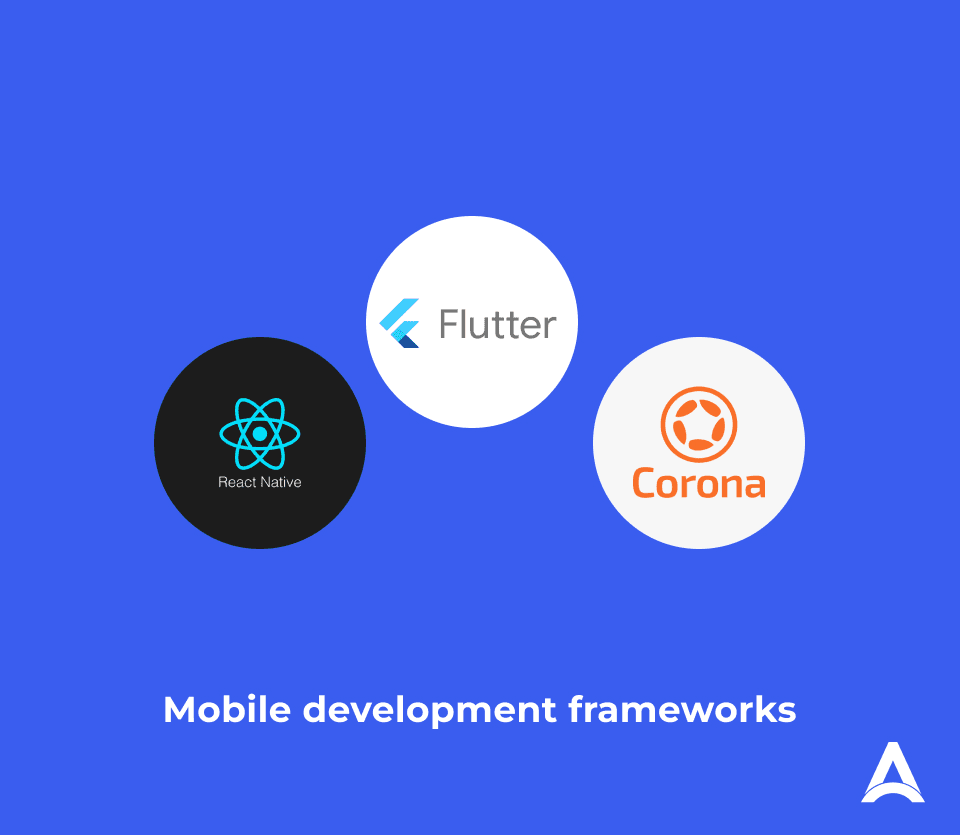
With the emergence of mobile applications, there is a surge in mobile development frameworks. These frameworks massively help in the development of mobile applications for Android, iOS, and more. They can either be native app frameworks or cross-platform frameworks.
React Native, Flutter, and Corona are the most popular Mobile development frameworks.
4) Desktop development frameworks
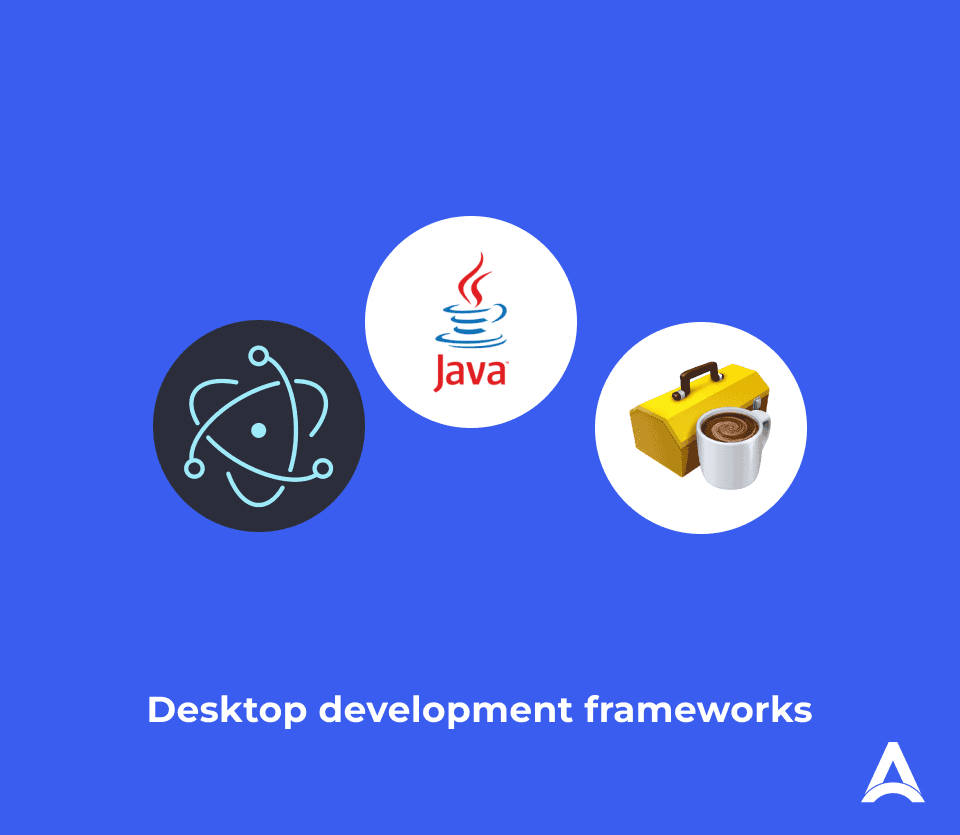
Desktop development frameworks are used for the development of desktop applications. You can build independent business applications, client-server apps, or plugins. To be precise: the applications that are run on desktops can benefit from these frameworks.
Electron, Swing, and Cocoa are a few of the most popular Desktop development frameworks.
What are the Benefits of using Software Frameworks?
Frameworks are widely loved in the development space due to the ease of use they offer in terms of offering a pre-made code base and principles that encourage easy web development. Basically, it provides developers with a blueprint that helps them navigate their way out effortlessly. Let us have a look at what benefits you can reap if you use or ever plan to use a Software Framework.
1) Reduced Code Length
Gone are the days when developers had to double their caffeine intake to write long, complex lines of code. This in turn leads to enhanced productivity which lets the developer divide and focus his time on the aspects of the project that matter the most. This functionality also enables them to automate a lot of tasks that would normally take up a lot of time to do like URL mapping, text storage, and much more.
2) Enhanced Security
Built-in security features and functionalities ensure that the website is safe from any viruses, malware, or security breaches. These frameworks go through stringent testing over and over again to ensure that there are no loopholes. A lot of frameworks are also open source which means that the security loopholes are tested by the public as well.
3) Hassle-free Testing
Frameworks can aid in pinpointing the exact problem once you begin troubleshooting. This makes it super efficient for developers in terms of testing. For example - If you are using a framework like React for your front end, will reduce your manual efforts for testing and you will not have to worry about the errors that had occurred before.
4) Dependability
As these frameworks are nurtured by developers, communities, and industries that leave no stone unturned in testing and maintaining them, they are extremely dependable. These frameworks also are kept updated according to the latest industrial trends and ever-changing demands so you never have to worry about it not working!
5) Lesser Bugs
Although programming languages do not focus on the legibility of code during flight, Frameworks do. Due to each framework being supported by a huge community, there is always a response to any problem almost immediately. Many frameworks also enable developers to run their first tests.
Are there any challenges?
Some say that frameworks are a double-edged sword while some may argue that it takes skill to do anything in life and frameworks are also based on the same principle. Nevertheless, we do feel like Frameworks do have some limitations.
1) You need to have the technical knowledge
Although frameworks can massively help a developer in terms of speed, efficiency, and time, it does require extensive technical and programming knowledge. There is no drag-and-drop functionality or a plug-and-play option to help you cross the technical bridge. Not only that, you would need to learn the ins and outs of the framework too. This can not be harnessed or utilized by someone who does not have a technical background, and even if you feel like learning it from scratch, it has a big learning curve.
2) It is not a one-size-fits-all approach
As much as we would like them to be a one-size-fits-all solution, they are not. Frameworks are not designed to take care of everything. They are built to serve a specific purpose, for example - providing a set of front-end functionalities. Some frameworks may not necessarily be a good fit for your requirements so it's best for you to test the waters before diving in.
3) Inefficient for small projects
Frameworks may not be ideal for small projects as setting up the framework would be more time-consuming than custom coding itself.
4) One bug can affect all applications built on the framework.
Even though bugs are very rare in frameworks, one bug may affect every application built on that framework. For developers, this is a nightmare and has to be dealt with extreme caution. Always chose a framework that has a good community to which you can go back for help and doubts.
Frameworks Vs. Libraries
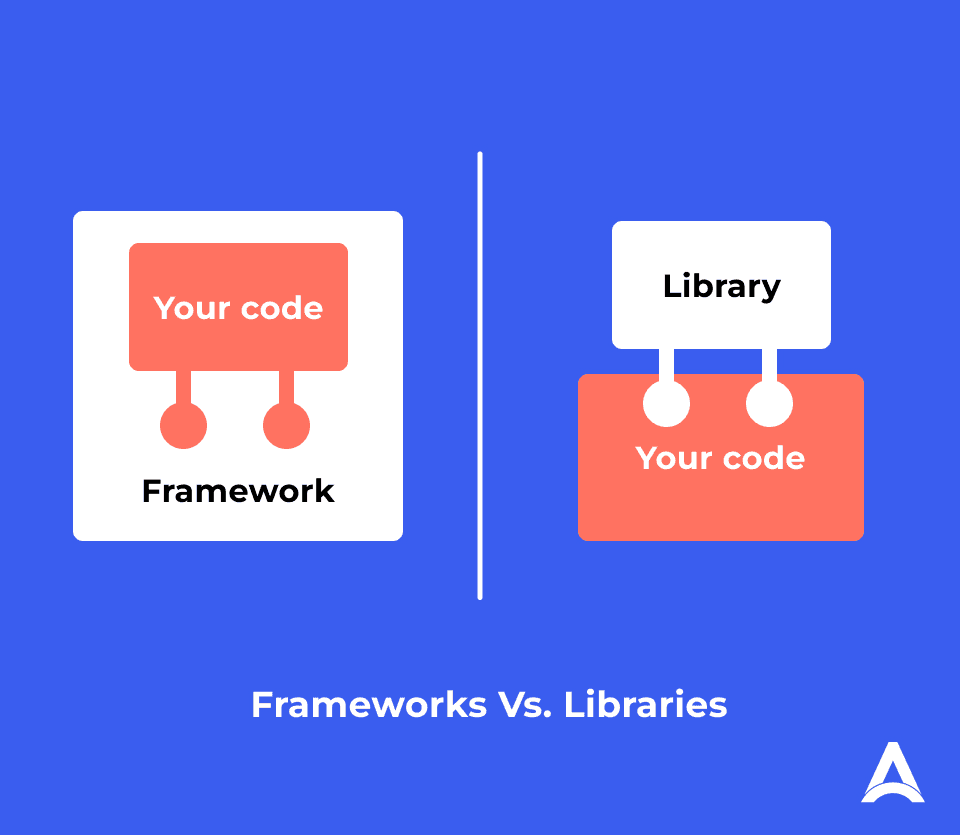
We have oftentimes heard developers using the terms Framework and Libraries interchangeably. This is one of the biggest misconceptions that float around the developers’ community. To be a master in the art of development, you need to know the key difference between both.
A library performs a fixed set of defined operations whereas frameworks are blueprints wherein the application encapsulates the contents of the operation by meshing with the blueprint. The blueprint is still required for coding to interlink the specifics but the most important task is done by the application solely.
Examples of libraries: Network protocols, compression, image manipulation, string utilities, regular expression evaluation, and math. Operations are self-contained.
Examples of frameworks: Web application system, Plug-in manager, GUI system. The framework defines the concept but the application defines the fundamental functionality that end-users care about.
Frameworks can go a long way….
Frameworks, be it any type can help you improve the efficiency of your development projects. By providing robust, speedy, and dependable patterns, they save you the hassle of writing long codes from scratch.
We can go on and on about the plethora of tools available in the development community that are integrated into programming languages of all sorts - from Ruby to Java. You just need to choose what works best for you and roll with it. These frameworks are specifically built to facilitate tasks such as backend or front-end development.
We understand that it can be a little overwhelming at first, but with a little research and a dollop of passion, you can overcome the learning curve and get started on your project to get the result you want!
Frameworks will not just help you save your resources such as time and energy but will ultimately help you make the best of your resources by giving you an unparalleled output! :)
Have any questions? DM us on our socials!
We’re quirky and informative here: Apric’s LinkedIn handle
We’re aesthetic and fun here: Apric’s Instagram Page
Until then, Stay tuned for our next blog! Ciao! 🙂

Apric
The time to design tomorrow’s employee experience is now. In a world where physical distance doesn't have to mean isolation, we're pioneering a new era of togetherness.
Together, we're not just working; we're making the world a better place, one connection at a time.
Ready to join us and experience the power of unity in the digital age?







